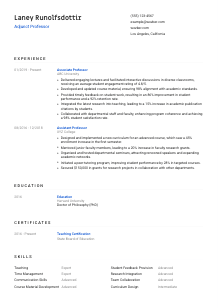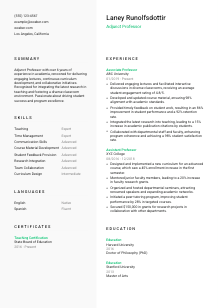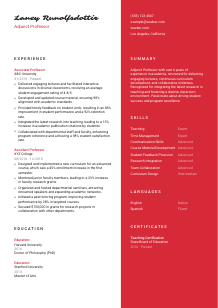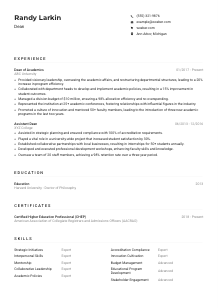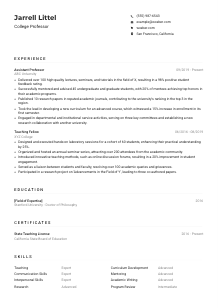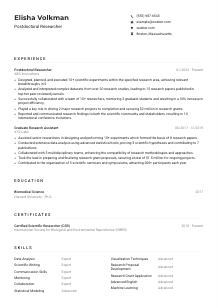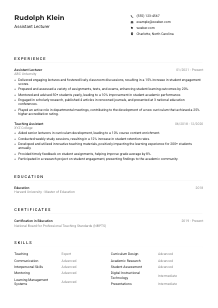Adjunct Professor Resume Example
Delivering knowledge, but your resume isn't making the dean's list? Smarten it up with this Adjunct Professor resume example, architectured using Wozber free resume builder. See how you can expertly blend your academic expertise with job requirements, ensuring your teaching career doesn't end up in a syllabus limbo!
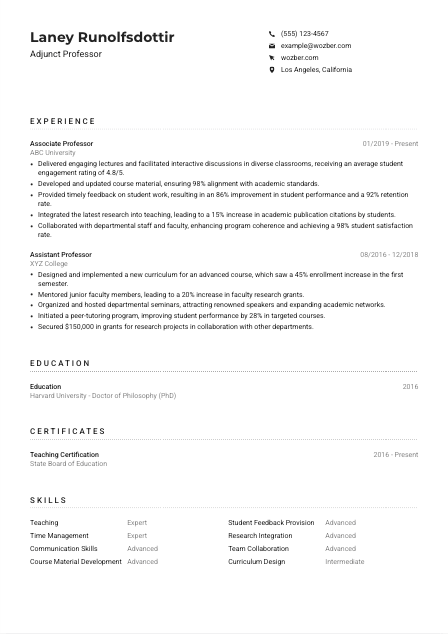
How to write an Adjunct Professor Resume?
Hello, future academic trailblazer! Stepping into the realm of academia requires not just knowledge and passion, but a resume that exemplifies your prowess as an Adjunct Professor. It's not merely about chronicling your experiences; it's about narrating your academic journey in a way that resonates with hiring committees. Fear not, for the Wozber free resume builder is here to guide you.
Together, we'll transform your resume into a masterpiece that not only showcases your academic flair but is also optimized for Applicant Tracking Systems (ATS). Let's sculpt your resume into an indomitable tool that paves your way into your desired collegiate level teaching role!
Personal Details
The 'Personal Details' section is akin to the opening act of your academic symphony. It needs to strike the perfect chord with potential employers right from the start. With precision and a touch of strategic formatting, let's ensure this section positions you as the ideal candidate for an Adjunct Professor.
1. Embrace Your Academic Identity
Begin with your name, making it the marquee of your resume. This is your academic brand, and it should be in a clear, prominent font. Under your name, align your aspirations by stating "Adjunct Professor," reflecting your immediate professional ambition and resonating with the job title.
2. Establish Your Contact Blueprint
Your contact information must be straightforward yet comprehensive. A phone number without glitches and a professional email format—preferably firstname.lastname@example.com—set the stage. This simplicity ensures that potential employers can easily reach you to discuss your future in academia.
3. Anchor Your Locale
For roles where geography is crucial, your location is a significant detail. Mentioning "Los Angeles, California" not only aligns with the job description's location requirement but also subtly reassures the college that you're ready to engage with students without relocation delays.
4. Weave in Your Professional Online Persona
In academia, your digital footprint can be as telling as your publications. Including a link to a professional website or a LinkedIn profile provides a window into your broader academic contributions and network, ensuring your resume breathes your scholarly spirit.
5. Edit Out the Excess
While it's tempting to include every achievement, remember, this is your handshake, not your autobiography. Omit any personal data not directly requested or relevant to the Adjunct Professor role to maintain professionalism and focus on your academic qualifications.
Takeaway
Think of the 'Personal Details' section as your academic calling card. It's concise yet complete, professional yet personal, ensuring that every word and detail serve a strategic purpose. With these tips, you're now ready to set an impressive and professional tone for the rest of your resume.





Experience
The 'Experience' section is where your academic journey unfolds. It's an opportunity to highlight your teaching excellence, student engagement, and collaborative achievements. Here's how to distill your rich teaching background into compelling evidence of your readiness for the Adjunct Professor role.
- Delivered engaging lectures and facilitated interactive discussions in diverse classrooms, receiving an average student engagement rating of 4.8/5.
- Developed and updated course material, ensuring 98% alignment with academic standards.
- Provided timely feedback on student work, resulting in an 86% improvement in student performance and a 92% retention rate.
- Integrated the latest research into teaching, leading to a 15% increase in academic publication citations by students.
- Collaborated with departmental staff and faculty, enhancing program coherence and achieving a 98% student satisfaction rate.
- Designed and implemented a new curriculum for an advanced course, which saw a 45% enrollment increase in the first semester.
- Mentored junior faculty members, leading to a 20% increase in faculty research grants.
- Organized and hosted departmental seminars, attracting renowned speakers and expanding academic networks.
- Initiated a peer‑tutoring program, improving student performance by 28% in targeted courses.
- Secured $150,000 in grants for research projects in collaboration with other departments.
1. Align With Academic Expectations
Begin by dissecting the job description, paying close attention to required experiences. For instance, experiences like "Delivered engaging lectures" directly mirror the listed responsibilities, thereby immediately demonstrating your alignment with the role's expectations.
2. Order Your Academic Saga
Present your roles in reverse chronological format, starting with the most recent. Each entry should list your job title, the institution, and the timeframe. This organization makes it easy for hiring committees to trace your academic progression and impact.
3. Illustrate Your Academic Prowess
For each position, provide bullet points that elucidate your accomplishments, particularly those that mirror the job description. For example, detailing how you developed course material or enhanced student engagement demonstrates your direct contribution to educational excellence.
4. Quantify Your Pedagogical Impact
Whenever possible, complement your achievements with quantifiable data. Statements like "improved student performance by 86%" offer tangible proof of your effectiveness and commitment to academic excellence, making your contributions vividly clear.
5. Tailor Your Narrative
Keep the focus on experiences that speak directly to the Adjunct Professor role. Extracurricular involvements are valuable, but in this section, the spotlight should remain on your teaching achievements, course development, and scholarly contributions to education.
Takeaway
Your 'Experience' section is a testament to your teaching journey, showcasing your dedication to improving student outcomes and driving academic growth. By carefully tailoring this section, you invite hiring committees into your academic world, revealing a professor dedicated to educational excellence.
Education
In academia, your educational background is not just a formality—it's the bedrock of your authority and expertise. The 'Education' section should reflect your academic preparation and alignment with the job requirements, signaling that you're not just a candidate, but an academic asset.
1. Showcase Your Academic Foundations
Identify and highlight the educational credentials that directly address the job's requirements. If a Master's degree is a must, ensure it's prominently listed. For an added edge, showcasing a Ph.D., as preferred by the job description, symbolizes not only compliance but distinction.
2. Structure for Clarity
Maintain a clean and straightforward format: degree, field of study, institution, and graduation year. This layout allows hiring committees to quickly assess your qualifications without detours, ensuring your academic achievements speak loudly and clearly.
3. Echo the Job's Academic Demands
Tailor the presentation of your degrees to match the job announcement. For example, a "Doctor of Philosophy (PhD) in Education" shows a deep alignment with the role's preference, underlining your preparedness and passion for the subject matter.
4. Optionally Highlight Relevant Courses
If your academic journey includes courses directly relevant to the job or the subject matter you'll be teaching, consider listing these. Though not always necessary, it can add another layer of specificity to your expertise, especially for subjects tightly aligned with industry trends.
5. Celebrate Other Academic Achievements
Though your degrees take center stage, don't overlook other academic accomplishments. Distinctions such as honors, relevant projects, or memberships in academic organizations can enrich your profile, offering a fuller picture of your engagement with the academic community.
Takeaway
Your 'Education' section is a declaration of your academic journey and preparedness. It should resonate with the specificity and requirements of the role, presenting you as not just a qualified candidate, but as an educator poised to contribute meaningfully to the academic community.
Certificates
In the academic realm, certificates are badges of continuous learning and specialization. For an Adjunct Professor, they can underscore your dedication to staying at the forefront of your field. Here's how to display these accolades for maximum impact on your resume.
1. Identify Certificates that Speak to the Role
Reflect on any certifications you hold and how they align with the role's specifics or the broader educational landscape. While the job description might not list specific requirements, certifications like a "Teaching Certification" directly support your qualification.
2. Curate for Impact
Focus on listing certificates that strengthen your candidacy. It's about quality, not quantity. Select certifications that relate closely to teaching excellence, subject matter expertise, or technological aptitude in education, ensuring each certificate underscores your readiness and agility.
3. Date with Precision
For certificates with a renewal or expiry date, including this detail is vital. It shows a commitment to maintaining your credentials and signals to institutions your commitment to upholding professional standards in an ever-evolving academic landscape.
4. Stay Proactively Informed
Education is a dynamically changing field. Actively pursue further certifications and workshops that not only bolster your resume but also enhance your teaching methodologies and subject expertise, ensuring you remain a competitive and forward-thinking educator.
Takeaway
Certificates on your resume underline your dedication to professional development and pedagogical excellence. They are tangible proof of your commitment to not just meet but exceed the expectations of an Adjunct Professor role, firmly placing you as an educator of distinction.
Skills
The 'Skills' section is where your pedagogical tools are showcased. It's an opportunity to align your professional toolkit with the requirements of the Adjunct Professor position, demonstrating your preparedness to foster an engaging and informative learning environment.
1. Catalog Essential Abilities
Dive into the job description and identify crucial skills. For an Adjunct Professor, this will likely include "Exceptional communication skills" and "Expertise in relevant subject matter." Listing these directly on your resume confirms your alignment with the role's demands.
2. Balance Hard and Soft Skills
Highlight a mix of subject-specific knowledge (hard skills) and interpersonal competencies (soft skills). Skills like "Curriculum Design" and "Team Collaboration" speak to your ability to foster both an enriching curriculum and a positive academic environment.
3. Prioritize Relevance
Resist the urge to list every skill you possess. Focus on those most critical to the role of an Adjunct Professor, ensuring that every skill mentioned contributes to a picture of you as a well-rounded, competent, and engaging educator.
Takeaway
Carefully curated, your 'Skills' section articulates your professional arsenal, tailored to meet and exceed the expectations of an Adjunct Professor role. It's a succinct showcase of your readiness to contribute to a productive and enlightening academic environment.
Languages
In the diverse world of academia, linguistic prowess can be a unique asset, enhancing your ability to connect with a multinational student body. Let's ensure your 'Languages' section enhances your candidacy for the Adjunct Professor position.
1. Align with Language Requirements
"Must demonstrate strong English language competence" is a crucial requirement for our Adjunct Professor role. Ensuring English is listed at a 'Native' or 'Fluent' level immediately signals your capability to meet this foundational requirement.
2. Elevate with Additional Languages
Beyond the must-haves, additional language skills can distinguish you in a globally connected classroom. If you have proficiency in languages beyond English, such as "Spanish: Fluent," it shows an added layer of versatility and cultural awareness.
3. Catalog with Clarity
When listing languages, clarity is key. Use descriptors like 'Native,' 'Fluent,' 'Intermediate,' and 'Basic' to provide a quick insight into your level of proficiency, helping hiring committees understand how you might engage with a diverse student population.
4. Honesty is the Best Policy
Be truthful about your language abilities. Overestimating your proficiency can lead to challenges down the line. A genuine portrayal of your linguistic skills sets realistic expectations and builds trust with potential employers.
5. Consider the Role's Scope
Reflect on the specific needs of the department and how your language skills could meet those needs. For a role heavily involved with international students or programs, your multi-linguistic capabilities could be a significant asset.
Takeaway
Your linguistic skills are more than just words on a resume; they are your ticket to fostering a more inclusive and engaging classroom environment. Highlighting these abilities can significantly enhance your appeal as an Adjunct Professor, ready to inspire a diverse cohort of students.
Summary
Your summary should be a powerful prelude to your academic narrative, capturing the essence of your professional identity. Let's craft a compelling summary that encapsulates your qualifications, achievements, and readiness for the Adjunct Professor position.
1. Grasp the Role's Core
Begin by internalizing the job requirements, ensuring your summary speaks directly to what hiring committees are seeking. For an Adjunct Professor, this means emphasizing your rich teaching experience, pedagogical innovation, and academic leadership.
2. Kick Off with a Strong Intro
Start with a statement that reflects your professional standing, such as "Adjunct Professor with over 6 years of experience in academia." This sets a solid foundation, indicating your seasoned engagement in the educational sector.
3. Highlight Your Suitability
Pinpoint and list your most relevant skills and accomplishments. Emphasize aspects like "renowned for delivering engaging lectures" and "continuous curriculum development," directly tying your capabilities to the job's needs.
4. Conciseness is Key
Keep your summary succinct, ideally around 3-5 lines. It's a snapshot rather than a detailed account, designed to intrigue and inspire hiring committees to delve deeper into your resume. Think of it as your elevator pitch in written form.
Takeaway
Your summary is the gateway to your professional narrative, offering a lens through which hiring committees can view your academic prowess. Tailoring it to reflect the essence and requirements of the Adjunct Professor role ensures you start off on the right foot, poised to make a lasting impression.
Launching Your Adjunct Professor Journey
Congratulations, academic aficionado! Armed with a finely crafted resume, you now stand at the threshold of your next great adventure in academia. Every section of your resume is a piece of the narrative that showcases your dedication and readiness for the Adjunct Professor role. Remember, this is not just a document—it's your professional manifesto, an invitation for institutions to recognize your potential.
With the Wozber free resume builder, ATS-friendly resume templates, and ATS resume scanner at your disposal, you're equipped to create a resume that not only meets but exceeds expectations. Now, go forth and let your academic journey unfold in exciting new directions. The academic world awaits your contribution!

- Master's degree in the related field;
- a PhD is preferred.
- Minimum of 3 years' experience teaching at a collegiate level, with a strong track record of student engagement and successful outcomes.
- Expertise in relevant subject matter with current knowledge of industry trends and developments.
- Exceptional communication skills, both written and verbal.
- Valid teaching certification or equivalent licensure.
- Must demonstrate strong English language competence.
- Must be located in Los Angeles, California.
- Deliver engaging lectures and facilitate interactive discussions in a diverse classroom environment.
- Develop and update course material, syllabi, and assessments to ensure alignment with academic standards.
- Provide timely feedback on student work and maintain regular office hours for student consultation.
- Stay current with the latest research and advancements in the field, integrating relevant material into teaching practices.
- Collaborate with departmental staff and faculty to ensure program and curriculum coherence.





